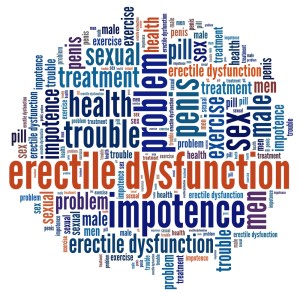Introduction
Erectile dysfunction or impotence has gained publicity since the discovery of sildenafil (brand name: Viagra).
With obesity, hypertension, diabetes and the polycystic ovary syndrome having increased in the population significantly in the last few decades, the metabolic syndrome (or syndrome of insulin resistance) has also increased. One of the symptoms of hormone imbalance is erectile dysfunction in the male and delay in sexual arousal in the female.
Hormone changes with obesity
How would extra fat in the abdominal area have an influence on a man’s sexual performance? In recent years the answer has become clear (see Ref. 27). Fat is not just sitting there, it is metabolically active and it contains aromatase, an enzyme that can produce estrogen hormones out of male hormones (testosterone and androstenedione). Estrogens are good for women when balanced with enough progesterone. However, in men they oppose testosterone and interfere with the normal mechanism of getting an erection and ejaculation at the right time. Men with obesity also have too much insulin, in other words the hormones are dysbalanced. Careful analysis of the hormones with saliva tests and blood tests can identify what missing hormones need replacing and an adjustment of lifestyle will do the rest. Bio-identical hormones are used as compounded creams and rubbed into the skin. This way erectile dysfunction will disappear without any side-effects (bio-identical hormones in the right concentration do not have side-effects).
Medication can be a cause of erectile dysfunction and the offending drug needs to be identified by the doctor. Many blood pressure medications can cause erectile dysfunction such as water pills, clonidine and Aldomet. However, before any changes are made the patient should let the doctor decide the best course of action to avoid, for instance, as high blood pressure and stroke could develop from sudden medication withdrawal.
Common causes of erectile dysfunction (=impotence)
Apart from hormonal causes there are a number of other possible reasons for erectile dysfunction such as arteriosclerotic disease of the penile arteries, side-effect of medications, neurological problems or side effects from prostate surgery.
Other Impotence Causes (neurological) can be a variety of conditions such as strokes, multiple sclerosis, seizure disorders, spinal cord injury, chronic back pain from back surgery or disc degeneration.
Prostate Surgery such as transurethral resection of the prostate for prostate enlargement
or prostate cancer surgery is associated with erectile dysfunction in about 45%.
Hardening of the arteries of the penile arteries is the main cause of older patients with erectile dysfunction.
Erectile Dysfunction Treatment
Sildenafil (brand name: Viagra) likely is the 1st choice impotence treatment, if other measures such as eliminating other causes has not been successful. Ask your doctor to give you a thorough work-up, explain the results to you and advice you what, if any, medication you might need. There likely will be some patients who may benefit from potency drugs, but I am concerned about the cardiovascular side-effects that are not present with balancing hormones back to where they were when the man was in his 30’s. So I prefer the method described above and this is usually done by a physician interested in anti-aging medicine.
More info:
1. Here is an interesting review of how erectile dysfunction and heart disease are connected.
2. More info on Low testosterone and depression in men: https://nethealthbook.com/news/depression-and-low-testosterone-in-men/
References
1. The Merck Manual, 7th edition, by M. H. Beers et al., Whitehouse Station, N.J., 1999. Chapter 235.
2. B. Sears: “Zone perfect meals in minutes”. Regan Books, Harper Collins, 1997.
3. Ryan: Kistner’s Gynecology & Women’s Health, 7th ed.,1999 Mosby, Inc.
4. The Merck Manual, 7th edition, by M. H. Beers et al., Whitehouse Station, N.J., 1999. Chapter 245.
5. AB Diekman et al. Am J Reprod Immunol 2000 Mar; 43(3): 134-143.
6. V Damianova et al. Akush Ginekol (Sofia) 1999; 38(2): 31-33.
7. Townsend: Sabiston Textbook of Surgery,16th ed.,2001, W. B. Saunders Company
8. Cotran: Robbins Pathologic Basis of Disease, 6th ed., 1999 W. B. Saunders Company
9. Rakel: Conn’s Current Therapy 2001, 53rd ed., W. B. Saunders Co.
10. Ruddy: Kelley’s Textbook of Rheumatology, 6th ed.,2001 W. B. Saunders Company
11. EC Janowsky et al. N Engl J Med Mar-2000; 342(11): 781-790.
12. Wilson: Williams Textbook of Endocrinology, 9th ed.,1998 W. B. Saunders Company
13. KS Pena et al. Am Fam Physician 2001; 63(9): 1763-1770.
14. LM Apantaku Am Fam Physician Aug 2000; 62(3): 596-602.
15. Noble: Textbook of Primary Care Medicine, 3rd ed., 2001 Mosby, Inc.
16. Goroll: Primary Care Medicine, 4th ed.,2000 Lippincott Williams & Wilkins
17. St. Paul’s Hosp. Contin. Educ. Conf. Nov. 2001,Vancouver/BC
18. Gabbe: Obstetrics – Normal and Problem Pregnancies, 3rd ed., 1996 Churchill Livingstone, Inc.
19. The Merck Manual, 7th edition, by M. H. Beers et al., Whitehouse Station, N.J., 1999. Chapter 251.
20. The Merck Manual, 7th edition, by M. H. Beers et al., Whitehouse Station, N.J., 1999. Chapter 250.
21. Ignaz P Semmelweiss: “Die Aetiologie, der Begriff und die Prophylaxis des Kindbettfiebers” (“Etiology, the Understanding and Prophylaxis of Childbed Fever”). Vienna (Austria), 1861.
22. Rosen: Emergency Medicine: Concepts and Clinical Practice, 4th ed., 1998 Mosby-Year Book, Inc.
23. Mandell: Principles and Practice of Infectious Diseases, 5th ed., 2000 Churchill Livingstone, Inc.
24. Horner NK et al. J Am Diet Assoc Nov-2000; 100(11): 1368-1380.
25. Ferri: Ferri’s Clinical Advisor: Instant Diagnosis and Treatment, 2004 ed., Copyright © 2004 Mosby, Inc.
26. Rakel: Conn’s Current Therapy 2004, 56th ed., Copyright © 2004 Elsevier
27. John R. Lee: “Hormone Balance for Men – What your Doctor May Not Tell You About Prostate Health and Natural Hormone Supplementation”, © 2003 by Hormones Etc.








